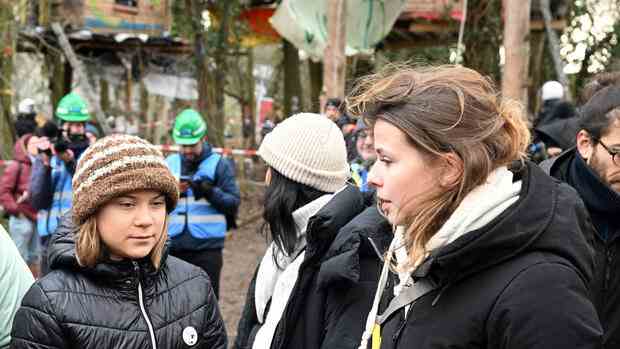Greta Thunberg and Luisa Neubauer in the Rhenish Revier.
(Photo: dpa)
The images from Lützerath are disturbing and moving at the same time. Young people who chain themselves to tree houses, let themselves be carried away by police officers, who are driven to considerable stamina by their desperation – and some of whom, unfortunately, are not averse to violence. People who believe very strongly in what they want to achieve and who are difficult to refute in terms of content. Nevertheless, the Lützerath protest is an example of how people can get involved in the right cause and still pursue the wrong solution.
It is clear that burning all the coal under Lützerath will make it impossible to reach the 1.5 degree target. That’s not an opinion, that’s physics.
And one can rightly ask oneself how honest the contortions of RWE, the Greens and the state government of North Rhine-Westphalia to justify lignite mining with security of supply are. After all, not only non-governmental organizations have refuted the necessity of coal mining under Lützerath, but also, for example, the German Institute for Economic Research (DIW).
But is a resistance that has a real core also wise?
Top jobs of the day
Find the best jobs now and
be notified by email.
You have to keep in mind how everyone involved got caught up in the Lützerath disaster: the green economics ministers of North Rhine-Westphalia and the federal government as well as RWE agreed in the autumn to continue promoting lignite under Lützerath. In return, RWE pledged to stop generating electricity from coal by 2030. A compromise, a balancing of private (RWE) and public (state and federal) interests.
Both sides gave a little. Both sides got a little.
What happens in the really polarizing questions?
The skirmish mood on both sides in Lützerath now draws attention to a central question: How will this country ever agree on an appropriate climate policy that does not polarize excessively?
If even this compromise, which was negotiated in an exemplary manner from a democratic and constitutional point of view, does not work, it will hardly succeed with other major issues. And there are some where a consistent climate policy would have to deal with much more complex conflicts.
The fact that lignite is not a viable energy source is undisputed, so the search for compromise should be trivial. But if it fails here, how is it supposed to work on issues in which the centrifugal forces are drifting further apart. For example in traffic (120 km/h? Domestic flight bans?), in nutrition (less meat? No meat at all?), in housing (less living space? Colder rooms?).
>> Read also: Why this entrepreneur became an activist
All questions in which the climate movement has not yet found a majority for its scientifically required line. Whether dealing with a democratic and constitutionally flawless process like in Lützerath now convinces the majority of society?
A majority climate protection narrative is missing
Political liberal-right forces certainly have a problem drafting a serious climate policy at all (as you could see again at the weekend with the CDU). The more ecologically oriented camp, however, has the problem of showing a correct and majority-capable way to its correct goals. The argument that the climate knows no compromises may be physically correct. Democratically, it leads to a dead end.
There is no strategy to spread the story of climate protection in such a way that it catches on. Of course, this is not only the fault of the protesters, politicians have not yet had an answer.
It becomes obvious in Lützerath that the current climate protection arguments are correct, but difficult to convey. Anyone with an idea to solve this dilemma would be doing the climate a greater favor than preventing a compromise solution in the Rhenish mining area.
More: Barricades and sirens – this is how the police clear Lützerath
